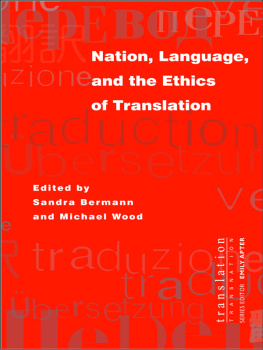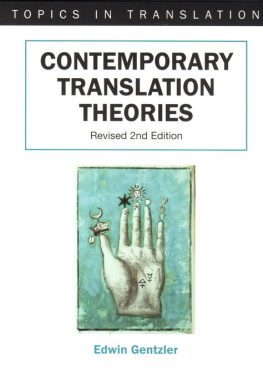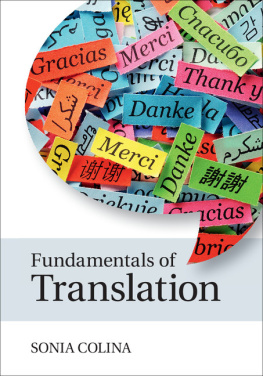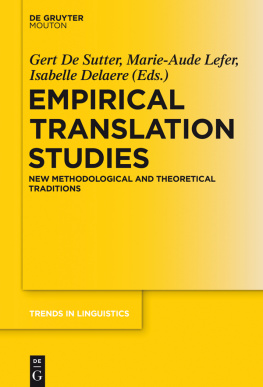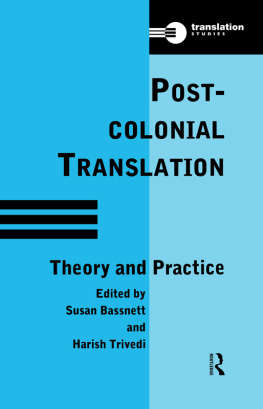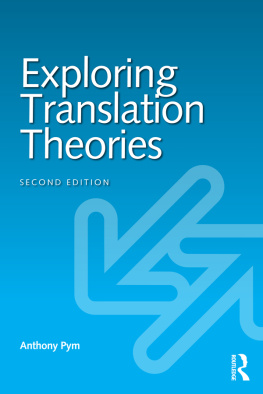
Nation, Language, and the Ethics of Translation
TRANSLATION |TRANSNATION
EDITED BY EMILY APTER
Writing Outside the Nation
BY AZADE SEYHAN
The Literary Channel: The Inter-National Invention of the Novel
EDITED BY MARGARET COHEN AND CAROLYN DEVER
Ambassadors of Culture: The Transamerican Origins of Latino Writing
BY KIRSTEN SILVA GRUESZ
Experimental Nations: Or, the Invention of the Maghreb
BY RDA BENSMAA
What Is World Literature?
BY DAVID DAMROSCH
The Portable Bunyan: A Transnational History ofThe Pilgrims Progress
BY ISABEL HOFMEYR
We the People of Europe? Reflections on Transnational Citizenship
BY ETIENNE BALIBAR
Nation, Language, and the Ethics of Translation
EDITED BY SANDRA BERMANN AND MICHAEL WOOD
Nation, Language, and the Ethics of Translation
EDITED BY SANDRA BERMANN AND MICHAEL WOOD
PRINCETON UNIVERSITY PRESS
PRINCETON AND OXFORD
Copyright 2005 by Princeton University Press
Published by Princeton University Press, 41 William Street, Princeton, New Jersey 08540
In the United Kingdom: Princeton University Press, 3 Market Place, Woodstock, Oxfordshire OX20 1SY
All Rights Reserved
LIBRARY OF CONGRESS CATALOGING-IN-PUBLICATION DATA
Nation, language, and the ethics of translation / edited by Sandra Bermann and Michael Wood.
p. cm. (Translation/transnation)
Includes bibliographical references and index.
ISBN 0-691-11608-3 (alk. paper) ISBN 0-691-11609-1 (pbk. : alk. paper)
1. Translating and interpreting. I. Bermann, Sandra, 1947 II. Wood, Michael, 1936 III. Series.
P306.N367 2005
418.02dc22 2004061697
British Library Cataloging-in-Publication Data is available
Publication of this book has been aided by the Princeton University Committee on Research in the Humanities and Social Sciences
This book has been composed in Goudy
Printed on acid-free paper.
pup.princeton.edu
Printed in the United States of America
10 9 8 7 6 5 4 3 2 1
CONTENTS
Sandra Bermann |
Edward Said |
Pierre Legrand |
Lynn Visson |
Samuel Weber |
Michael Wood |
Gayatri Chakravorty Spivak |
Henry Staten |
Robert Eaglestone |
Stanley Corngold |
Jonathan E. Abel |
Emily Apter |
Lawrence Venuti |
Jacques Lezra |
Yopie Prins |
Sandra Bermann |
Azade Seyhan |
Stathis Gourgouris |
Franoise Lionnet |
Gauri Viswanathan |
Vilashini Cooppan |
Sylvia Molloy |
David Damrosch |
ACKNOWLEDGMENTS
We offer our warmest thanks to Emily Apter and Mary Murrell, whose firm and thoughtful support was important to us at every stage, and to Hanne Winarsky who joined the project near the end. We are also immensely grateful to Amanda Irwin Wilkins, whose practical help has been invaluable. In fall 2002, we were fortunate to have the opportunity to collaborate on this volume at the Institute for Advanced Study; we thank those who made that stay possible. We are also grateful to the two anonymous readers for Princeton University Press, who made shrewd and welcome critical suggestions, and to the University Committee on Research in the Humanities and Social Sciences for the subvention of this volume.
Individual acknowledgments accompany each essay.
Nation, Language, and the Ethics of Translation
Introduction
SANDRA BERMANN
There has probably never been a time when issues of nation, language, and translation have been more important or more troubling than they are today. In a world where individual nation-states are increasingly enmeshed in financial and information networks, where multiple linguistic and national identities can inhabit a single states borders or exceed them in vast diasporas, where globalization has its seriousand often violentdiscontents, and where terrorism and war transform distrust into destruction, language and translation play central, if often unacknowledged, roles. Though the reasons for this are undeniably complex, they are, at least in broad terms, understandable. Waves of migrating peoples have made the contemporary nation-state, and especially its urban centers, into global sites with multiplicities of languages and cultures. At the same time, the international trade, finance, and information technologies that support these sites both depend upon and often seek to bypass translation for economic growth within world and regional markets.
The global reach of international law and politics only heightens the importance of language and translation. Military networks, governmental agencies, as well as international entities such as the United Nations, the United Arab Emirates, and the European Union translate for purposes of intelligence, negotiation, and the dissemination of information or propaganda, as do the growing number of nongovernmental (NGOs) agencies, be they religious or secular. Global media and information networks provide news and interviews on a minute-to-minute basis to serve multiple linguistic constituencies as well as specific cultural and political purposes.
In a world of rapidly transforming populations and technologies, where language and citizenship are caught up in tightly woven webs of economic, military, and cultural power, language and translation operate at every juncture. Indeed so central is translations role that, as Ilan Stavans recently noted, with only a hint of hyperbole, modernity is not lived through nationality but through translationality.
Parts of this essay were presented at the American Comparative Literature Association Convention in 2004. I am indebted to colleagues there as well as to Michael Wood and to the readers for Princeton University Press for their very helpful suggestions.
Yet if language and translation have become increasingly important in national and international relations, and in the processes of globalization more generally, their role as cultural as well as linguistic entities is only beginning to be theorized. The social sciences, that have so well described our political, economic, military, and information networks, have, for the most part, ignored these issues or considered them simply a necessary interface. This is most likely because, in their very texture, these linguistic matters belong so fully to what we traditionally think of as the humanities. Yet closely considered, language and translation in fact open up the unavoidable complexities, the historically ingrained problems and prejudices, and the intense day-to-day negotiations that occupy our interwoven global communities, setting into stark relief the difficult suturing of global networks and the over-stressed joints of the international body politic. They tend to raise questions about linguistic power and the dissemination of texts in various media; they bring to the fore issues of human rights as well as intellectual property; they also illuminate disparities among states, nations, and local traditions, and the often tragic problems of linguistic and cultural diasporas; they reveal complex multiplicities in the shadow of apparent unity.
Next page
